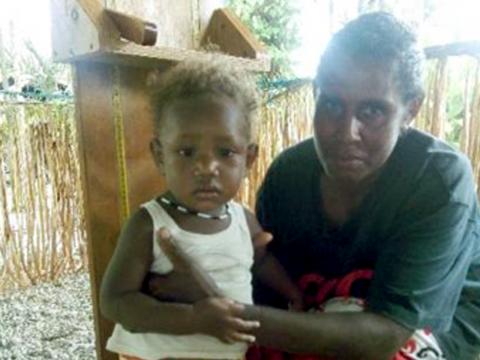Driven by a passion to improve health in her community

Margaret has dedicated her time and energy to helping her community, particularly by advising pregnant women to go to the nearest clinic for health check-ups or to give birth. She also assists mothers who have given birth at home to travel to health facilities for postnatal health checks as well as advising them on the importance of exclusive breastfeeding.
Margaret started as a Village Health Volunteer (VHV) in World Vision’s Maternal Child Health project in 2012 and continued as a VHV in the Health System Strengthening project, funded by the Australian government.
The Solomon Islands Ministry of Health and Medical Service does not have a formal village health worker program. To address the needs of community-based primary health care, World Vision has developed Village Health Committees (VHCs) and Village Health Volunteers (VHVs) in each of the communities where we work in the Solomon Islands.
The VHCs are made up of influential and trusted community members including, where possible, health workers from nearby health facilities, school boards, church representatives and village chiefs. VHCs have a job description that is agreed to by all members and facilitated by World Vision. The main task of VHCs is the identification and selection of potential VHVs. Additionally, the VHCs are trained by World Vision on basic management skills in supporting the tasks of VHVs, monitoring and health. VHCs are responsible for supporting and supervising the selected VHVs and participating in the development of community health implementation plans.
VHVs like Margaret are trained by World Vision staff and health workers and supported by their VHCs to undertake a five-module training course on general health topics. These include selected Timed and Targeted counselling model activities such as community mapping, household visits to pregnant women and newborns with key health messaging, community awareness on hygiene and sanitation, nutrition, main child killer diseases (diarrhoea, respiratory infections, malaria and others) and the promotion of immunisation. VHVs also engage with health facility staff and support community mobilisation for outreach activities, referral systems and encourage community members to seek medical attention and health facility delivery.
The five key components of Timed and targeted counselling are:
- Key health messages are shared at appropriate times during a woman’s pregnancy and the first 1000 days of her child’s life;
- Messages are delivered in the woman’s home where male partners, grandmothers, mothers-in-law etc. are also present;
- VHVs discuss barriers to preferred health practices and work with the family to negotiate a feasible shift in their behaviours towards these preferred practices;
- Husbands and fathers are engaged and counselled to promote their positive influence on maternal, newborn and child health, nutrition and development, leading to better outcomes for the mother and child;
- Newborn care is integrated as the VHV has access to the home in the first week of life. This is particularly helpful in the event of a home birth.
The training has been very useful for Margaret. She shared her experience of assisting in the delivery a baby, “A pregnant woman was having contractions and I accompanied her to the clinic. She was lying down and breathing heavily. I went to the nurse and she allowed me to assist her during the delivery. She gave me a pair of gloves and some cream. I was a bit nervous thinking about what I had learnt from the training as well as from the nurse, but together we delivered the baby safe and sound.”
Dr Raul Schneider, World Vision’s Senior Health Advisor for the Pacific, explained, “The use of VHVs for community awareness on main child killer diseases and identification of danger signs has helped to increase awareness and reduce the prevalence of diseases that are easily preventable but cause the highest mortality among children in the Solomon Islands. In remote areas of the country with limited health services, VHVs are a major contributor to educating community members and encouraging the adoption of good health practices. VHCs play a crucial role in the sustainability of the VHV program.”
Margaret shared, “I can see that pregnant women have started going to the clinic for check-ups and babies are healthier.”
The Health System Strengthening project operated in Makira, South Malaita and Central Islands province from June 2017 to June 2019.